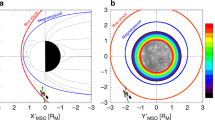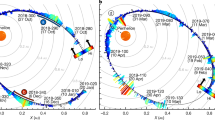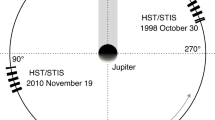Abstract
IN the sputtering process an incident particle beam loses part of its energy to recoil motion of target atoms, some of which may escape through a nearby surface. The sputtering yield, S, is defined as the number of atoms ejected per incident particle. In the Solar System, sputtering will occur whenever the solar wind, consisting mainly of 1 keV AMU−1 hydrogen and helium ions, strikes a material body. Many years ago, Wehner et al.1 suggested that solar wind-induced sputtering of the lunar surface should be an important cause of erosion; recently, analyses2 of returned lunar material have been interpreted quantitatively3 in terms of such solar-wind sputtering. Mars provides another example of the interaction of the solar wind with a planetary body. However, in contrast to the lunar surface, the martian surface is largely protected from direct solar wind bombardment by its atmosphere. The primarily CO2 atmosphere is thin by terrestrial standards but still opaque to the solar wind. We discuss here whether solar-wind sputtering of the martian atmosphere is a mechanism leading to significant mass loss.
This is a preview of subscription content, access via your institution
Access options
Subscribe to this journal
Receive 51 print issues and online access
$199.00 per year
only $3.90 per issue
Buy this article
- Purchase on Springer Link
- Instant access to full article PDF
Prices may be subject to local taxes which are calculated during checkout
Similar content being viewed by others
References
Wehner, G. K., KenKnight, C. E. & Rosenberg, D. L. Planet. Space Sci. 11, 1257–1261 (1963).
Epstein, S. & Taylor, H. P. Geochim. cosmochim. Acta Suppl. 6, 2, 1771–1778 (1975).
Switkowski, Z. E., Haff, P. K., Tombrello, T. A. & Burnett, D. S. J. geophys. (1975).
Michel, F. C. Rev. Geophys. Space Sci. 9, 427–435 (1971).
Spreiter, J. R., Summers, A. L. & Rizzi, A. W. Planet Space Sci. 18, 1281–1299 (1970).
Sigmund, P. Phys. Rev. 184, 383–416 (1969).
Zinner, E., Walker, R. M., Chaumont, J. & Dran, J. C. Geochim. cosmochim. Acta Suppl. 7, 2, 953–984 (1976).
Roth, J., Bohdansky, J., Poschenrieder, W. & Sinha, M. K. J. nucl. Mat. 63, 222–229 (1976).
Weissmann, R. & Sigmund, P. Radiation Eff. 19, 7–14 (1973).
Nier, A. O. et al. Science 193, 786–788 (1976).
Liau, Z. L., Brown, W. L., Homer, R. & Poate, J. M. Appl. Phys. Lett. 30, 626–628 (1977).
Haff, P. K. Appl. Phys. Lett. 31, 259–260 (1977).
Nier, A. O., McElroy, M. B. & Yuk Ling Yung, Science 194, 68–70 (1976).
Author information
Authors and Affiliations
Rights and permissions
About this article
Cite this article
HAFF, P., SWITKOWSKI, Z. & TOMBRELLO, T. Solar-wind sputtering of the martian atmosphere. Nature 272, 803–804 (1978). https://doi.org/10.1038/272803a0
Received:
Accepted:
Published:
Issue Date:
DOI: https://doi.org/10.1038/272803a0
Comments
By submitting a comment you agree to abide by our Terms and Community Guidelines. If you find something abusive or that does not comply with our terms or guidelines please flag it as inappropriate.



